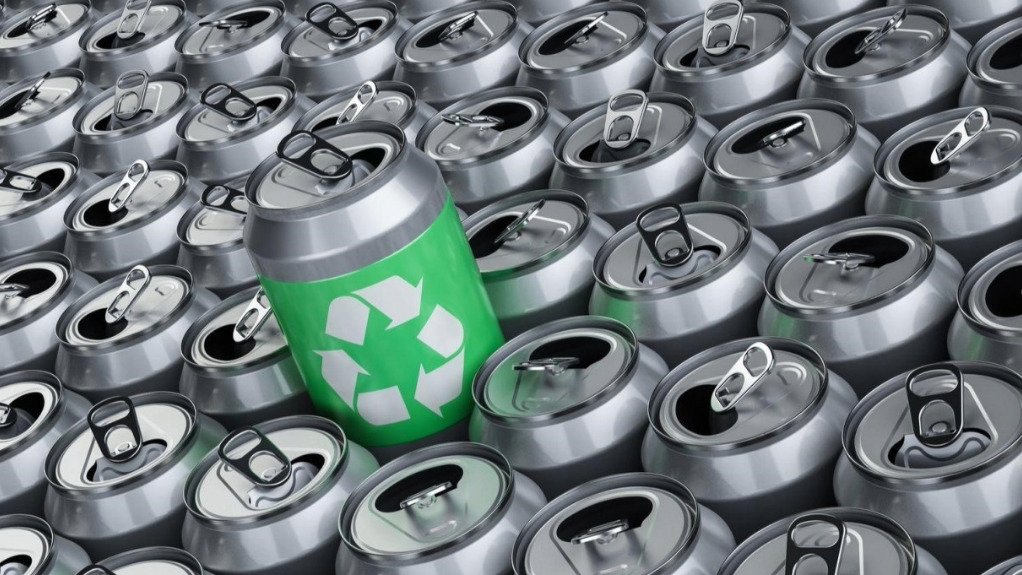South Africa’s scrap recycling lags behind global trends



CAN DO ATTITUDE A positive perspective to South Africa's aluminium recycling capabilities needs to be attained to compete globally
MUZI MANZI The country will be negatively impacted by Carbon Border Adjustment Mechanism and other cross-border mechanisms if it does not improve on its energy sources and recyclability
It is undeniable that aluminium is one of the most recyclable materials in circulation globally, with about 75% of the total 1.5-billion metric tonnes of aluminium generated to date still in use, says industry representative organisation Aluminium Federation South Africa (AFSA) CEO Muzi Manzi.
He adds that almost 30-million tonnes of aluminium scrap are recycled globally every year, solidifying its position as one of the most frequently recycled commodities, which can be done without experiencing any degradation in its quality.
“Locally, South Africa’s aluminium sector provides substantial economic value to the country,” he states, adding that it is a prominent contributor to the country’s economic and social fabric, with its yearly production capacity exceeding 700 000 t.
The industry also provides job opportunities up and downstream of the value chain and remains a source of foreign income through exports.
However, a substantial challenge facing South Africa’s aluminium scrap availability going forward is that aluminium scrap recycling figures remain markedly low.
He attributes this to low awareness among the population about circularity and the need for recycling infrastructure, particularly in rural areas.
“Scrap metal recycling plays a vital role in sustainability in the aluminium industry,” he stresses.
Importantly, the industry also needs more quality scrap metal at competitive prices, owing to uncontrolled exports, which continue to rise despite prevailing government regulations such as the Price Preference System and export taxes.
In 2023, South Africa’s scrap metal exports totalled R5.2-billion, and aluminium accounted for R1.1-billion of that figure.
Manzi suggests a complete ban on scrap metal exports and adequate port control could significantly change the industry.
“In line with this, AFSA is optimistic about the proposed amendments to the Second-Hand Goods Act, chiefly regarding the proposal to ban the use of cash in the scrap trade, as it may be one of the significant measures the country needs to improve access to scrap metal and deter exports,” he says.
Formalising the Informal
“Scrap collection requires both the formal and informal structures to function adequately as they contribute towards the supply and demand dynamic,” says Manzi.
There is a dire need to increase efforts to encourage recycling at the source through targeted educational campaigns to avoid used beverage cans and similar products ending up in landfill sites.
“These awareness programmes will assist, mainly, in countering households that lag far behind in recycling rates,” he adds.
Luckily, scrap metal generated through manufacturing processes finds its way into the supply chain easily or gets absorbed internally because companies attach significant value to this type of scrap.
Further, to heighten awareness, AFSA periodically offers its ‘Introduction to Aluminium Course’, a training intervention that covers the importance of recycling and the need to “green” the aluminium value chain.
“We also publish a quarterly newsletter that provides the latest developments around the circular economy,” he points out.
‘Go Green or Else’
Manzi underlines that the implementation of the Carbon Border Adjustment Mechanism (CBAM) by the EU, which will come into effect in 2026, will affect the South African aluminium industry immensely, owing to the high carbon intensity of the country’s electricity production.
Considering that the aluminium industry accounts for between 7% and 8% of the country’s electricity consumption, greening the country’s energy mix will significantly improve the industry’s prospects.
“The silver lining, though, is that the rules and regulations enforced by the CBAM might motivate the South African aluminium industry to invest in cleaner technologies and improve energy efficiency and sustainability to reduce the industry’s carbon footprint,” he enthuses.
With the CBAM and other cross-border mechanisms, such as the one planned by the UK, it is imperative that the country accelerate investment in cleaner technologies and renewable energy.
“The South African Government has recently implemented the Just Energy Transition Investment Plan for the 2023 to 2027 period, which is a testament to this need,” he adds.
He points out that AFSA remains the “only voice and gateway” of the South African aluminium industry, continuously advocating for aluminium as the material of choice.
“As AFSA, our goal is to continue educating people and our members on ways to transition to greener aluminium through collaboration with other international associations, the government, and the local aluminium industry,” concludes Manzi.
Article Enquiry
Email Article
Save Article
Feedback
To advertise email advertising@creamermedia.co.za or click here
Press Office
Announcements
What's On
Subscribe to improve your user experience...
Option 1 (equivalent of R125 a month):
Receive a weekly copy of Creamer Media's Engineering News & Mining Weekly magazine
(print copy for those in South Africa and e-magazine for those outside of South Africa)
Receive daily email newsletters
Access to full search results
Access archive of magazine back copies
Access to Projects in Progress
Access to ONE Research Report of your choice in PDF format
Option 2 (equivalent of R375 a month):
All benefits from Option 1
PLUS
Access to Creamer Media's Research Channel Africa for ALL Research Reports, in PDF format, on various industrial and mining sectors
including Electricity; Water; Energy Transition; Hydrogen; Roads, Rail and Ports; Coal; Gold; Platinum; Battery Metals; etc.
Already a subscriber?
Forgotten your password?
Receive weekly copy of Creamer Media's Engineering News & Mining Weekly magazine (print copy for those in South Africa and e-magazine for those outside of South Africa)
➕
Recieve daily email newsletters
➕
Access to full search results
➕
Access archive of magazine back copies
➕
Access to Projects in Progress
➕
Access to ONE Research Report of your choice in PDF format
RESEARCH CHANNEL AFRICA
R4500 (equivalent of R375 a month)
SUBSCRIBEAll benefits from Option 1
➕
Access to Creamer Media's Research Channel Africa for ALL Research Reports on various industrial and mining sectors, in PDF format, including on:
Electricity
➕
Water
➕
Energy Transition
➕
Hydrogen
➕
Roads, Rail and Ports
➕
Coal
➕
Gold
➕
Platinum
➕
Battery Metals
➕
etc.
Receive all benefits from Option 1 or Option 2 delivered to numerous people at your company
➕
Multiple User names and Passwords for simultaneous log-ins
➕
Intranet integration access to all in your organisation

















